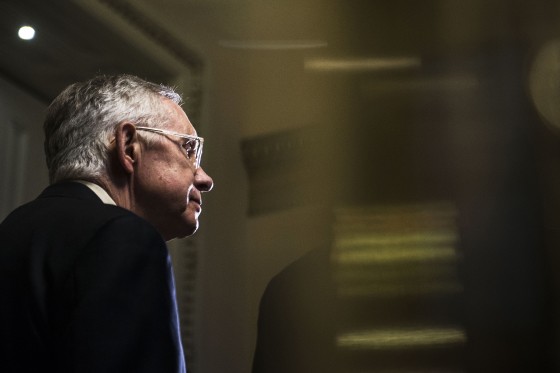A few weeks ago, in an unusually silly display, House Speaker Paul Ryan (R-Wis.) formally urged Director of National Intelligence James Clapper to block Hillary Clinton's intelligence briefings ahead of the election. It didn't take long for Clapper to dismiss the appeal as nonsense.
But the practice of providing intelligence briefings to the major-party nominees remains very much on the political world's mind. Donald Trump, for example, during his ridiculous press conference yesterday, argued that Clinton shouldn't have access to sensitive information because her top aide, Huma Abedin, "is married to Anthony Weiner, who's a sleazeball and a pervert.... I don't like Huma going home at night and telling Anthony Weiner all of these secrets, OK?"
Remember, this was an actual argument, presented publicly, by the Republican Party's national nominee.
Soon after, Senate Minority Leader Harry Reid (D-Nev.) told the Huffington Post that Trump's Russian ties create an alarming complication when it comes to these pre-election briefings. "I would suggest to the intelligence agencies, if you're forced to brief this guy, don't tell him anything, just fake it, because this man is dangerous," Reid said. "Fake it, pretend you're doing a briefing, but you can't give the guy any information."
Soon after, a House Democrat took the additional step of formally requesting the executive branch "withhold classified materials and briefings from Donald Trump." Rep. David Cicilline (D-R.I.), a member of the House Foreign Affairs Committee, announced the move in a press release late yesterday:
"The Republican nominee's call for hostile foreign action represents a step beyond mere partisan politics and represents a threat to the republic itself. It suggests that he is unfit to receive sensitive intelligence, and may willingly compromise our national security if he is permitted to do so," wrote Cicilline. "With this in mind, I respectfully ask that you withhold the intelligence briefing to Mr. Trump in the interests of national security."
The letter went on to say Trump's volatile actions "warrant a re-examination of his access to this sensitive intelligence. [Yesterday's remarks from Trump] reflect more than just a lack of good judgment -- it is an explicit call for intervention from an adversarial foreign power to undermine the American democratic process, and represents an action just short of outright treason."
For the record, I don't expect the appeal to work. Intelligence agencies wouldn't want to take sides in a partisan fight during an election year.
But Trump's own actions are raising concerns rarely heard about a presidential candidate.
Sen. Tom Cotton (R-Ark.), a Trump supporter, told CNBC's John Harwood last week that Trump's support for Putin may change after the presidential hopeful "begins to receive classified briefings" and learns some of the facts.
I'm still not sure how anyone can be confident the information Trump receives will be kept confidential.
